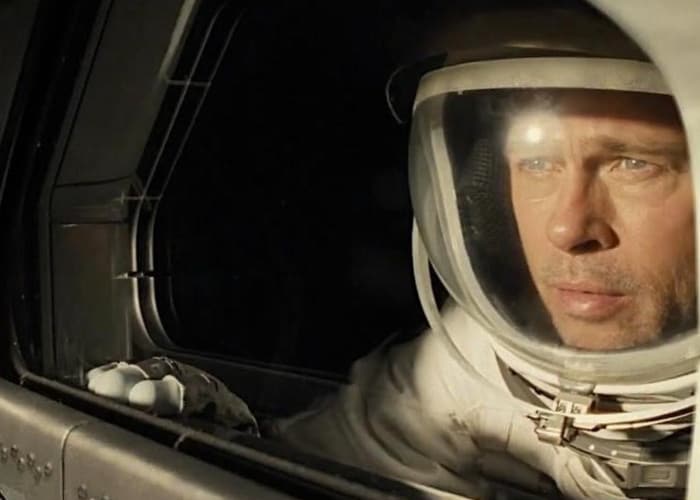
We’ve always had movies about the grand adventure that is “space” with films portraying epic battles, intergalactic piracy, alien shenanigans, and more on a fairly regular basis. Far less common are the movies that take their time among the stars seriously with stories built around the sad, troubled humans rocketing into the darkness in what amounts to a tin can. Recent years have given us examples ranging from the good (Interstellar, 2014) to the very good (Gravity, 2013) to the brilliant (Aniara, 2019), and now director James Gray (The Lost City of Z, 2016) has entered into the fray with a thrilling and affecting space-set gem of his own.
Roy McBride (Brad Pitt) is a well-respected astronaut with a crumbling marriage (to a frequently out of focus Liv Tyler) and a coldly efficient demeanor. His pulse remains steady through even the most harrowing of experiences — the film opens with McBride working on an atmosphere-breaking antenna tower before an incident sends men and metal plummeting towards the earth below — and his focus is always on the job at hand rather than feeling anything with his heart. The man he’s become, one unable to show feelings or weakness, is due in large part to the father who left him behind. Legendary space pioneer H. Clifford McBride (Tommy Lee Jones) broke numerous barriers on his way to the known edge of the solar system before disappearing, but now Roy’s higher-ups have reason to believe he’s still alive.
It’s a classic good news/bad news situation, though, as they also believe he’s behind a recent rash of destructive electrical surges that have been slamming the planet with deadly results. Cliff isn’t responding to communication attempts, so they task his son with traveling to Mars in the hope that he can accomplish what they can’t. Roy’s a man who follows orders, but on a journey fraught with close calls, nightmarish attacks, and a Lunar Rover chase across the surface of the moon — and straight out of Fast & Furious 12 — it’s a trip destined to leave him a changed man. If he survives at all, of course.
Gray’s latest is arguably his best as Ad Astra tells a remarkably intimate story set against an epic backdrop. Large-scale calamities on Earth, gorgeous visuals capturing the expanse of space, a handful of sequences straight out of the action and horror genres, and more paint a picture of a grand adventure, but the focus through it all remains Roy’s inner journey of redemption and awareness. It can sound trite on the page, but the film does a warmly affecting job of leaving viewers equally focused and invested on the human story despite the flashy surroundings.
It’s a low-key film more often than not, and while it’s punctuated with up tempo genre beats the through line is as calm as Roy’s heart rate. Cinematographer Hoyt Van Hoytema (Interstellar) captures every frame of action beautifully but never neglects the struggle playing on Roy’s face. We see his cold demeanor and watch its early trembles as the possibility of answers first excites and then terrifies him, and the visuals are aided — perhaps too much so — by Pitt’s whispered voice-over narration sharing Roy’s inner thoughts both insightful and obvious. The common touchstone on that point seems to be the work of Terrence Malick, but Francis Ford Coppola’s Apocalypse Now (1979) is far more fitting as Roy makes his long, frightening journey towards the Col. Kurtz-like goal that is his father.
Early glimpses of Jones’ Cliff through archival footage and dialogue praising the legend reveal a man once revered by many whose isolation and access to something unknown have led to possible madness. That suggestion, paired with other teases in the script (co-written by Gray and Ethan Gross) involving the possibility of alien life, build an air of menace and dark wonder behind Roy’s journey, and all of it works to maintain suspense throughout what is more than anything else an intimate personal drama. Roy’s past has been dictated by his father’s absence, but his future is dependent on his own presence.
Don’t let all this talk of intimacy scare you off, though, as Gray still ensures that Ad Astra delivers just as well with its action, scope, and fun. Yes, fun — the sequence where Roy and a crew he’s hitched a ride with stop to investigate a distress beacon is a terrifically entertaining shift into horror. If it feels out of place it’s by design as practical terrors built on man’s hubris in exploration and research pairs well with the bigger existential picture at stake here. Beats like these lift viewers’ pulses even if they leave Roy’s untouched before easing things back to a more meditative path, but through it all Gray maintains an increasingly propulsive feel moving both Roy and viewers towards a reunion that might make or break the man and the Earth itself.
As mentioned, the narration is sometimes a bit much — a problem more often than not with narration itself — but for every line that feels unnecessary the next leaves viewers simply feeling, and that’s not something to be undervalued in what amounts to studio genre fare. The supporting cast is also something of a mixed bag as endlessly welcome talents like Ruth Negga, Donald Sutherland, and Natasha Lyonne are present but given too little to do. It’s understandable as this is Roy’s story, but you’re still left wanting more of them.
Ad Astra is a thoughtful, thrilling, and contemplative experience captured with sensory details that astound, delight, and terrify. It’s one man’s journey, but it’s a reminder for all of us to value the now and the people sharing it with us.
Related Topics: Ad Astra, Brad Pitt, James Gray
